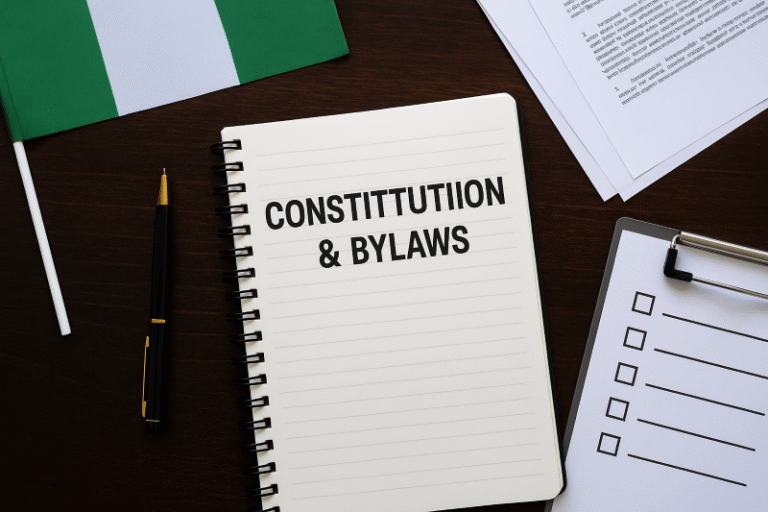Alumni associations in Nigeria often start with enthusiasm but lose steam after a few years. One of the most overlooked reasons is simple: weak or missing constitutions and bylaws. Some alumni associations operate without clear rules, while others copy generic templates that do not fit their context. The result is the same: poor governance, lack of appraisal of alumni leadership, constant disputes, and unavailability of reference documents to manage conflicts when they arise.
From our experience as education lawyers, a tailored constitution is not mere copycat; it is the engine of continuity, trust, and value creation for alumni bodies and their alma mater.
Why Tailored Constitutions Matter
For Nigerian school and alumni associations, a constitution provides what we know call the “4 Cs” key benefits:
- Continuity: ensures the association does not collapse when leaders leave.
- Clarity: reduces disputes by spelling out rights, duties, and resolution
- Credibility: builds members, donors and partners confidence because the association is structured, governance is credible and not ad hoc.
- Collaborations: aligns alma mater’s alumni relations office with the alumni association.
Without these 4 Cs as the foundations, alumni networks and office face the same problems: members’ disengagement, financial opacity, poor leadership appraisal, and weak governance.
Constitution vs. Bylaws
Although often used interchangeably, A constitution and bylaw are not the same.
- A Constitution sets the association’s vision, structure, and high-level governance rules.
- Bylaws provide the operational details: meeting frequency, quorum, financial reporting, and elections.
Both should be living documents that are reviewed and updated as alumni needs evolve.
Core Elements Every Alumni Constitution Needs
Nigerian alumni constitution should include:
- Name, Purpose, and Mission: why the body exists.
- Membership: who qualifies, rights, and obligations.
- Leadership Structure: offices, tenure, and responsibilities.
- Succession Rules: how leaders emerge and transition.
- Committees: finance, programs, nominations, knowledge and training.
- Meetings: quorum, notice, and decision-making rules.
- Amendments: how the constitution itself can be changed.
- Dissolution: what happens to assets if the body winds down.
A missing or vague section in any of these areas leads to pointing accusing fingers. Indeed, our education lawyers have uncovered a credible link between poor students’ wellbeing and a disengaged alumni relations and network.
The Lagos Business School Alumni Charter: A Preferred Alternative?
Mainstream practice in Nigeria is to hold elections for every alumni position, including President. This often creates campaign fatigue, divides members, and undermines continuity.
The Lagos Business School Alumni Association Charter takes a different approach:
- The Vice President is elected and automatically becomes President after tenure – unless disqualified.
- The President serves two years as ex-officio after completing office, ensuring continuity.
- The Alumni Office oversees the Association’s activities and acts as its secretariat.
Lagos Business School Alumni Association (“LBSAA”) model reduces power struggles, ensures stability, and allows alumni leaders to be judged by performance rather than politics.
We recommend LBSAA model as a continuity-driven governance model worth adapting by other Nigerian alumni associations.
A Checklist for Alumni Leaders
Here is a quick checklist alumni leaders can use to test their constitution:
☑ Does it clearly define membership rights and obligations?
☑ Are leadership roles and succession rules unambiguous?
☑ Is there a system for transparent fundraising and finance management?
☑ Does it set out compliance with Nigerian law (data protection, NGO/tax rules)?
☑ Is there a mechanism for poor appraisal of leaders and corrective action?
☑ Is the constitution available to all members, not locked in secret files?
If the answer to any of these is No, the association is already at risk.
Implementation Tips
Drafting a strong constitution is only half the job, and a thankless job when a criminal litigation lawyer drafts an alumni constitution.
Yet, implementation is the competitive edge:
- Engage alumni early: circulate drafts and collect feedback.
- Get buy-in: hold ratification meetings and explain why rules matter.
- Review regularly: at least once every five years.
- Keep it accessible: share the document openly with members, not just executives.
A transparent, available constitution signals trust. An unavailable one fuels suspicion and apathy.
Value Creation, Not Just Risk Avoidance
Strong constitutions do more than prevent disputes. They create value:
- Alumni take pride in belonging to a structured, well-governed body.
- External partners are more willing to fund or collaborate.
- Institutions view their alumni as credible allies, not disorganized groups.
In any case, an alma mater’s well-executed students’ wellbeing policy gives impetus to a constitution as value-creating tool.
Conclusion
Too many alumni associations in Nigeria are weakened by poor appraisal of leaders, unavailable constitutions, and weak governance rules.
Drafting and adopting a fit-for-purpose constitution is the first step to reversing this trend.
The Lagos Business School alumni charter models an alternative to mainstream election-heavy systems that exist — but do not work.
Where schools prioritise students’ wellbeing, alumni associations that adopt continuity-driven, transparent, and accessible constitutions will build communities that last, raise funds transparently, and deliver value to members and their alma mater.
We help Nigerian universities safeguard their reputation, anticipate risks, and handle crises so that university leadership can focus on academic excellence. We combine our education law practice with alumni consulting expertise — focusing on membership engagement, fundraising enablement, compliance, and governance.


